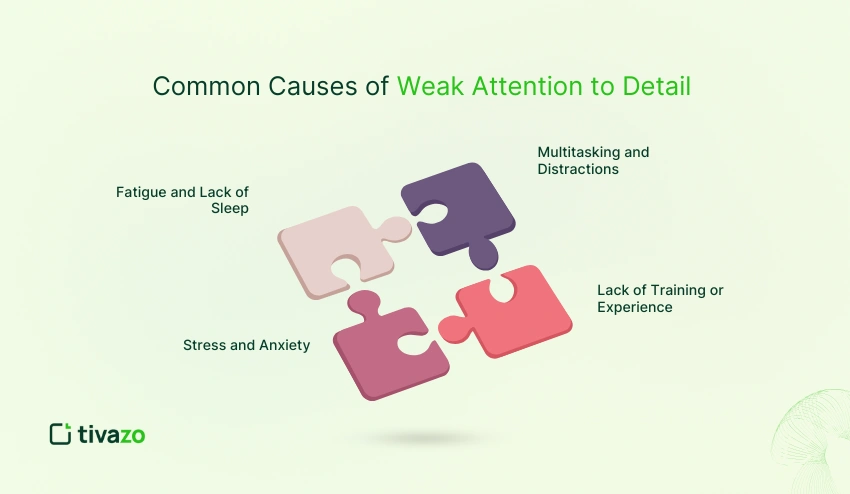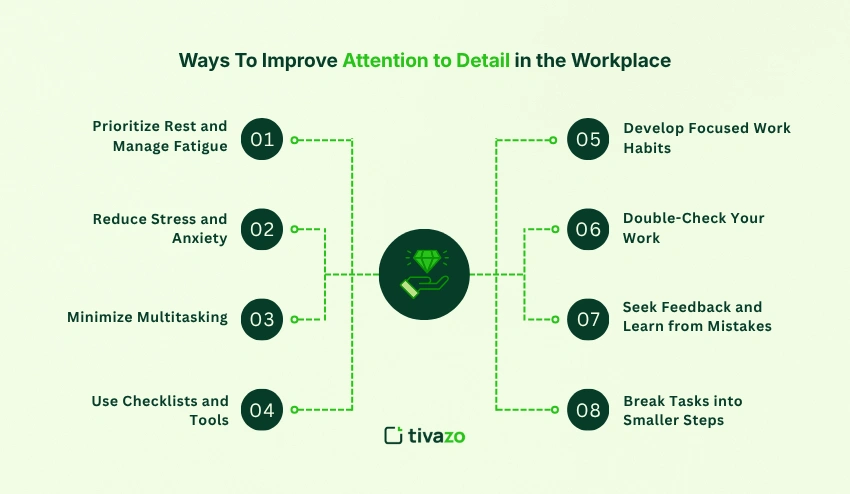Attention to Detail Synonyms
Single-Word Synonyms
- Precision
- Accuracy
- Thoroughness
- Diligence
- Meticulousness
- Exactness
- Conscientiousness
- Carefulness
- Scrupulousness
- Vigilance
Phrase Synonyms
- Eye for detail
- Keen observation skills
- Strong focus and concentration
- Quality-oriented mindset
- Detail-oriented approach
- Commitment to excellence
- High standards of accuracy
- Close attention to accuracy
- Dedication to perfection
- Consistent quality control
What Is Attention to Detail?
Attention to detail is the skill to remember every bit of something one is doing, regardless of how little it is, to achieve accuracy, quality, and consistency of the end product. It involves paying attention, being comprehensive, and accurate so that people can detect and correct mistakes before they are turned into expensive ones.
In simple terms, attention to detail refers to being able to see what other people may not see: a data inconsistency, a design flaw, a missing comma in a report. Individuals who are keen on detail give accurate, complete, and reliable work that creates trust and enhances performance in general.
What is Attention to Detail in the Workplace?
Attention to detail in the workplace is the skill of an employee to work with accuracy, consistency, and care in his or her duty, making sure that no aspect of a task is left out. It implies checking work twice, adherence to processes, and excellent quality, even in emergency situations. This is a professional skill that can minimize errors, guarantee a better output, and increase the overall reputation of a company as trustworthy and high-quality.
Common Causes of Weak Attention to Detail
Lack of attention to detail is a typical issue that influences productivity and quality of work. To be able to improve concentration and reduce errors, it is necessary to understand why people pay poor attention to details.

1. Fatigue and Lack of Sleep
One of the primary factors that can contribute to poor attention to detail is fatigue, because it lowers mental acuity and concentration. The brain becomes fatigued, so it finds it hard to pick up subtle mistakes, therefore reducing the accuracy of the work that needs to be done attentively.
Sleep deprivation further deteriorates inadequate attention to detail as it affects memory and judgment capacity. With time, constant sleep deprivation may contribute to the fact that it becomes more and more difficult to be consistent and comprehensive in work.
2. Stress and Anxiety
Stress and anxiety usually result in poor concentration due to the fact that the mind is always concerned with worries and not the job being done. Stress leads to mental overloading and thus makes it convenient to ignore small yet significant information.
There are also physical reactions to stress, such as tension and heart rate, which also negatively affect concentration. This leads to poor attention to detail, which is more evident when the tasks are in a hurry or when there is pressure to complete the tasks.
3. Multitasking and Distractions
Multitasking is a major cause of poor attention to detail, as it takes the mental resources and allocates them to two or more jobs. Distractions in the environment, like noise or computer interruptions, may easily divert concentration and lead to missing important details.
Even the short failures as a result of interruptions support feeble attention to detail, which results in recurrent errors. When one is constantly working on several things simultaneously, the brain cannot concentrate in its entirety, and hence, the quality of work that is done is lower.
4. Lack of Training or Experience
Weak attention to detail may be caused by inexperience or lack of training, since one may not be able to see the nuances involved to get the correct results. Small mistakes tend to pass unnoticed when one does not know the right way to do things.
Weak attention to detail can be reinforced through proper training and advice, which will educate about systematic methods to review and check work. The skill development will guarantee that there are fewer errors and more dependable performance in the long run.
Lack of attention to detail can be solved by determining its causes and taking measures to enhance concentration and precision. The identification of the factors contributing to poor attention to detail is the initial step towards the improvement of the quality and accuracy of work.
How to Improve Attention to Detail in the Workplace? (10 Ways)
Accuracy, efficiency, and professional credibility cannot be maintained without improving attention to detail at the workplace. Even minor errors may take up time and resources, and thus, attention to detail can be improved by covering the strategies to do it.

1. Prioritize Rest and Manage Fatigue
Rest is also an important measure of enhancing attention to detail at the workplace. Employees are better rested and their cognitive ability is clearer, thus detecting mistakes and concentrating is easier.
Chronic fatigue reduces focus of attention, and the chance of making errors is high. To ensure that attention to detail does not decline during the day, it is possible to create a regular sleeping schedule and have short breaks during working days.
2. Reduce Stress and Anxiety
Stress management is one of the important ways of enhancing attention to detail at work. When the level of stress is high, it may overwhelm the mind, and it will find it hard to focus on minor yet significant details of the work.
Attention to detail can be improved with the help of such techniques as mindfulness, deep breathing, or short relaxation exercises. Employees are able to concentrate more by lessening the stress levels and enhancing accuracy and productivity as well.
3. Minimize Multitasking
The prohibition of multitasking helps to enhance attention to detail in workplaces. When we give our attention to a single task, the brain is able to process information well, thus minimizing the possibility of making mistakes.
Attention to detail is usually impaired by interruptions that come with emails, notifications, or even concurrent projects. It is important to prioritize tasks and perform them in a sequence to enhance the quality and accuracy of work.
4. Use Checklists and Tools
Checklists and productivity can be used to increase attention to detail at work. These tools give a systematic way of doing things, whereby no step is missed.
Digital applications or plain written checklists assist employees in going through their work systematically. The introduction of such techniques strengthens the focus on details and encourages the promotion of regular performance.
5. Develop Focused Work Habits
It is important to develop targeted work habits to enhance attention to detail at work. This involves allocating a certain time slot to high-priority activities and reducing distractions during such activities.
Regularly doing something aids the brain in developing a concentration mechanism that, in turn, improves attention to detail. Time-concentrated habits result in more accurate and dependable work results over time.
6. Double-Check Your Work
One of the practical methods, which will enhance attention to detail in the workplace, is regularly reviewing and checking work. Mistakes can be easily checked through thorough examination, even prior to the completion of activities.
The habit of verification should be adopted to make sure that mistakes are reduced to a minimum. In the long run, this habit results in more focus on detail and a reputation for precision and dependability.
7. Seek Feedback and Learn from Mistakes
Feedback also helps in enhancing attention to detail at the place of work. Constructive criticism assists in determining trends of negligence and indicates the areas to be given more attention.
Through the evaluation of errors and the use of lessons learnt, employees can slowly increase their attention to detail. Ongoing improvement is associated with increased precision and the quality of work.
8. Break Tasks into Smaller Steps
Division of the bigger duties into smaller, manageable ones enhances attention to detail at the workplace. When it comes to being more precise and avoiding mistakes, it is better to concentrate on one part instead of the other.
It is also easier to follow the progress and detect problems at an early stage with the help of this approach. Workers who embrace the step-by-step workflow tend to be very attentive to details at all times.
9. Limit Distractions in the Work Environment
Establishing a distraction-free environment will increase the concentration on detail at the workplace. By reducing noise, clutter, and unwarranted interruptions, employees can be able to work on tasks completely.
Environmental control assists the brain in being focused and minimizes the chances of negligence. Intense concentration is good in clean and regulated working environments.
10. Continuously Train and Improve Skills
Continued learning and development are essential to heightened attention to detail in the workplace. New methods, tools, and techniques sharpen the mind and make it more precise.
Investment in personal and professional development makes it a regular asset of paying attention to detail. Ongoing improvement creates a culture of precision, efficiency, and quality production.
To become more attentive to the details at the workplace, one has to make a conscious effort and implement effective strategies. Through these ten strategies, the employees are able to improve concentration, minimize mistakes, and improve their overall performance.
What are the Signs of Good Attention to Detail?
Being attentive to detail goes beyond observing small things, and it is also an indication of the capability of a person to be accurate, consistent, and comprehensive in all duties. Those employees or individuals who exhibit this ability usually shine through since they can deliver quality work that is reliable, they have no mistakes, and they work towards the benefit of the team.
Here are the key signs of strong attention to detail:
- Accuracy in Work: Tasks are completed correctly the first time with minimal errors.
- Thoroughness: Every step of a process is followed carefully, leaving nothing overlooked.
- Consistency: Work output is uniform and maintains high standards across projects.
- Strong Organizational Skills: Information, tasks, and materials are systematically arranged.
- Observational Skills: Able to spot small mistakes, discrepancies, or anomalies quickly.
- Time Management: Completes work efficiently without sacrificing precision.
- Analytical Thinking: Able to evaluate details critically and identify potential issues.
- Conscientiousness: Takes responsibility for quality and double-checks work before submission.
- Problem Prevention: Catches potential mistakes before they escalate into larger problems.
- Adaptability: Adjusts attention to detail based on task complexity and priority.
These signs indicate that an individual can reliably handle complex tasks, maintain quality, and support strong quality control and consistency in the workplace.
Is attention to detail a skill or quality?
Attention to detail is both a skill and a quality.
Attention to detail, like any other skill, can be acquired and enhanced by practicing, training, and using tools or formal procedures such as checklists and two-pass review. It entails methods of enhancing attention, precision, and attentiveness.
As a quality, it reflects a person’s natural tendency to be thorough, conscientious, and meticulous in their work. Individuals with this quality naturally notice small errors, maintain high standards, and consistently produce accurate and reliable results. Combining both the skill and the innate quality maximizes productivity, reliability, and overall performance.
How Companies Measure Attention to Detail
Attention to detail is also frequently evaluated in companies where the employees are expected to be accurate, consistent, and produce quality products. Such skill is essential in positions where every mistake might be expensive, e.g., in the financial sphere, data processing, quality control, and customer care. It is effectively measured through a combination of tests, evaluations, and performance metrics in organizations.
Here are the common methods companies use:
- Performance-Based Assessments: Employees may complete sample tasks, such as proofreading documents, entering data, or analyzing reports, to evaluate accuracy and thoroughness.
- Attention to Detail Tests (ADT): Standardized tests measure the ability to spot errors, inconsistencies, or patterns in numbers, text, or images. These tests correlate with job performance, especially in detail-critical roles.
- Peer and Supervisor Reviews: Managers and colleagues provide feedback on work accuracy, reliability, and ability to follow processes consistently.
- Error Tracking Metrics: Companies monitor mistakes, rework rates, and quality control statistics to identify employees who consistently demonstrate strong attention to detail.
- Checklists and Process Audits: Structured processes, like checklists or SOPs, allow managers to track whether tasks are completed correctly and completely.
By using these methods, companies can objectively measure attention to detail, improve hiring decisions, and implement targeted training to enhance accuracy, efficiency, and overall quality in the workplace.
Conclusion
Being detail-oriented is a very important skill and attribute that leads to accuracy, consistency, and excellence in the workplace. Since one can learn its importance and start to understand the main pitfalls, apply the strategies that have proven their value, and monitor the progress, this ability results in high-quality work and increases productivity in general.
Through systematic procedures, attention to detail, mindfulness, and ongoing feedback, one can minimize errors, increase effectiveness, and keep a high quality level in general, both at the individual and organizational levels. Naturally careful or trained to be so, mastering attention to detail forms a basis of professional achievements, dependability, and trust.




